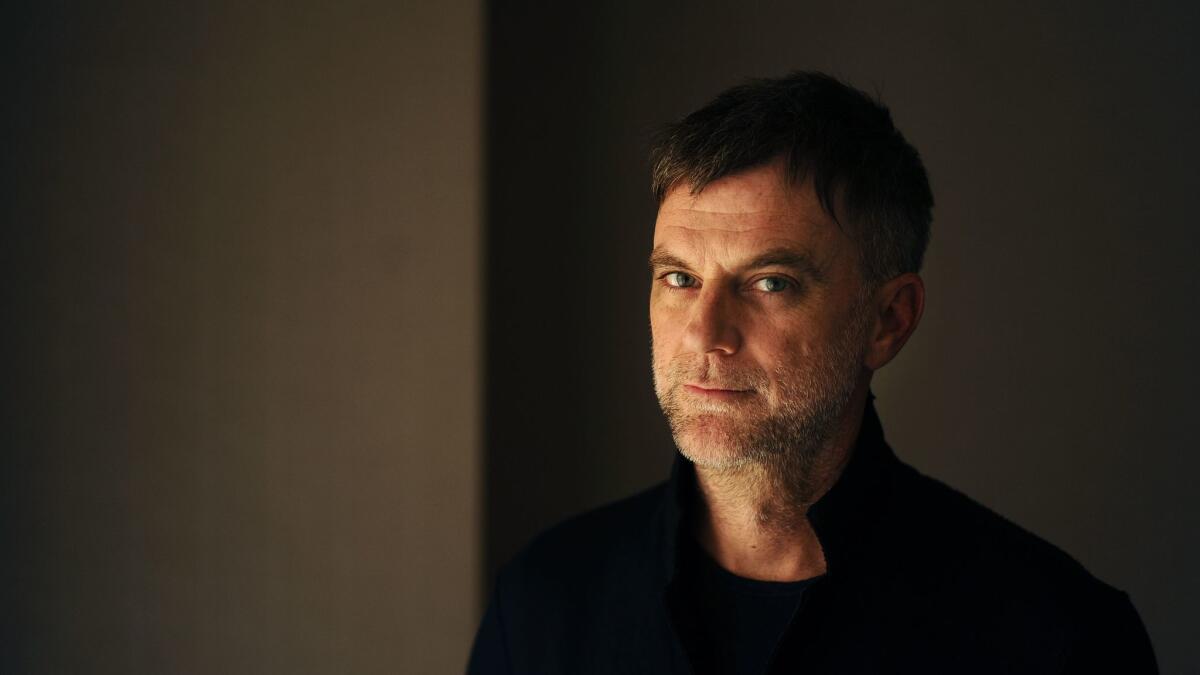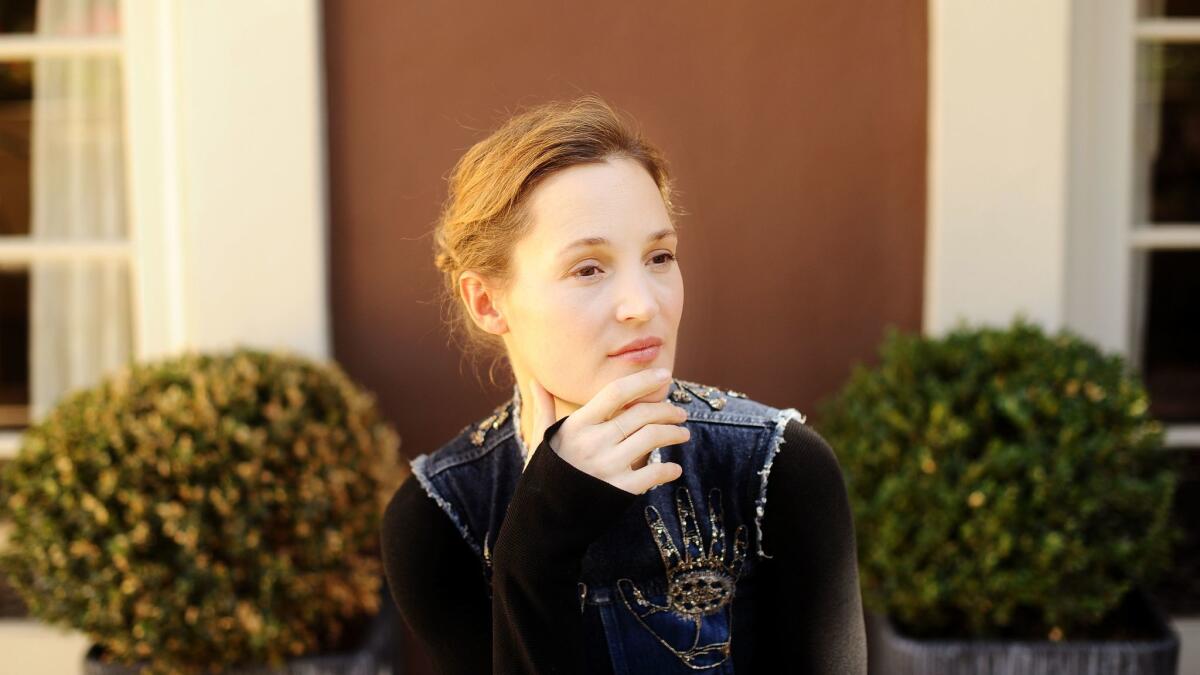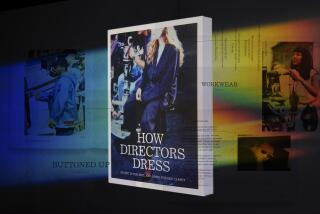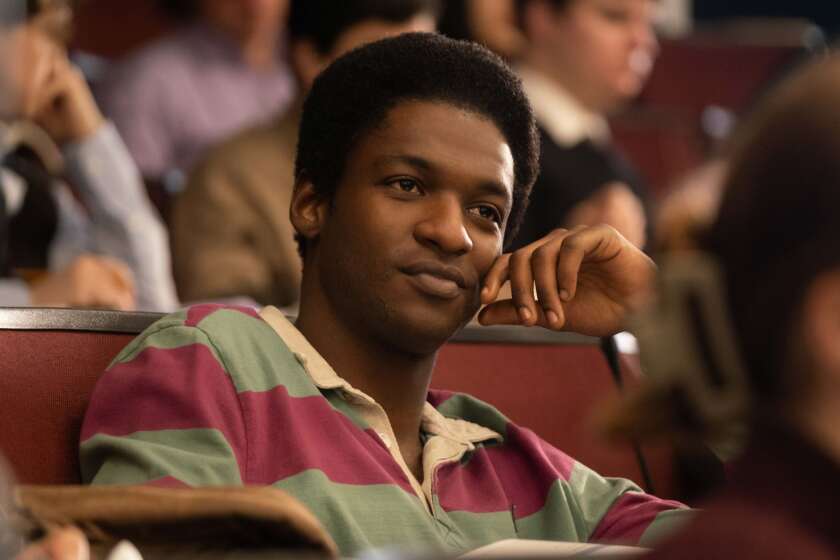Paul Thomas Anderson and collaborators unravel the mysteries of ‘Phantom Thread’

Each new film from writer-director Paul Thomas Anderson now arrives on a wave of expectation and mystique. With its evocative use of period and place, his work moves from a sweeping philosophical expansiveness to refined details with startling ease.
His new film, “Phantom Thread,” which opens Christmas Day, has added expectations from the fact that its star Daniel Day-Lewis has announced he intends to retire from acting, so this could likely be his last screen role.
Anderson and Day-Lewis collaborated on 2007’s “There Will Be Blood,” which resulted in three Oscar nominations for Anderson and the second of his now-record-breaking best actor Oscar wins for Day-Lewis. That film was recently named the best film of the 21st century so far by the critics of the New York Times. Their reunion ramps up anticipation even further.
Until “Phantom Thread” began screening for press just after Thanksgiving, precious little was known about it, with minimal promotional materials released. Like a bespoke suit or designer gown, delicate, careful attention has been given to all the details in Anderson’s latest work, protecting its exquisite, ineffable tone.
The film is both swooning and unhinged, sexy without being explicit, at once somber and witty. Feeling at the same time classical and unconventional, “Phantom Thread” manages to remain buttoned up while knowing how to throw down.
“I never like the idea of trying to figure out how to talk about a film before it’s done or before it’s out; that seems crazy to me. And too hard,” Anderson said in Los Angeles, where he lives. “But on the other hand, it’s really important to find the ways to get the people to understand what the film is, create trailers and materials that are interesting. Mysterious but, hopefully, not obtuse.”
“Phantom Thread” is set in the world of 1950s couture fashion in London — making for Anderson’s first feature set completely outside the American West — and casts Day-Lewis as Reynolds Woodcock, a designer of high-end women’s clothing. Woodcock’s tightly organized world, aided and overseen by his sister Cyril (Lesley Manville), is thrown into disarray by the arrival of Alma (Vicky Krieps), a waitress in a seaside hotel who enters his world as muse and disruptor.
“This was something that really came fresh and unexpectedly. And that was really an exciting thing,” Anderson said of the story’s origins. “There’s always the feeling, like, ‘Will I ever have a good idea again?’ And so to get at one that felt really good, ‘Oh, I want to follow through on this, I want to keep pursuing this.’
“And it got me to places — usually writing is just an excuse for research, anyway, half the time. It’s an ability to take time to do reading that you have not had time to do in the past year that you’ve been finishing a film or shooting one.”
Among that research were the ghost stories of the British writer M.R. James, at once cozy and spooky — a tone also evoked by “Phantom Thread.” An avid watcher of old movies and TCM, Anderson also turned to the works of Powell and Pressburger, David Lean’s “Brief Encounter” and “The Passionate Friends,” Alfred Hitchcock’s “Rebecca” and “Vertigo.” Anderson’s exploration of the shifting dynamics of a romantic partnership and unexpected tension between control and spontaneity has roots in these influences.
This was something that really came fresh and unexpectedly. ... There’s always the feeling like, ‘will I ever have a good idea again?’
— Paul Thomas Anderson on ‘Phantom Thread’

He reached out to Day-Lewis when he had, in his own words, “probably 20 or 30 pages of just sort of random notes and random scenes and random ideas and random samples of dialogue without much weight to it.”
When Anderson mentioned something about the Spanish fashion designer Cristóbal Balenciaga, he says Day-Lewis’ eyes lighted up and they were off. Anderson would check in with the actor as he was writing, leaning into or away from certain ideas as Day-Lewis was doing research and preparations of his own. (In a sign of their close collaboration, Anderson credits Day-Lewis with coming up with the name Reynolds Woodcock.)
Day-Lewis suggested Manville, best known for her films with Mike Leigh, including “Another Year” and “Mr. Turner,” for the role of Woodcock’s watchful, considered sister Cyril, who manages his business and keeps his temperament at an even keel. For the role of Alma, Anderson knew he wanted to find someone new, or as he put it, “a face that hadn’t been overused.”
That would lead to Krieps, a Luxembourg-born actress living in Berlin. Anderson first noticed her in the 2014 German drama “The Chambermaid,” and she has also had small roles in the English-language films “Hanna” and “A Most Wanted Man.”
“Straight off the bat, she looked right,” Anderson said. “She had a face that looked exactly right. From a certain angle she can look kind of sad even if she’s not sad. And then step around to the other side and she’s absolutely fashion model gorgeous.”
But it wasn’t just her looks that got Krieps the role, as Anderson said, “It was the inner strength that won above all. So, yes, you have this outside gloss — yeah, great — but she has this thing when she sort of stuck out her jaw that she was going to win a fight.”
During a recent interview in Los Angeles, Krieps said she was not intimidated by the prospect of being in so many scenes alone with Day-Lewis, whose commitment to his performances has become the stuff of legend.
“It is intimidating when you sit down and you think about it. So I didn’t sit down and I didn’t think about it,” Krieps said of her costar. “I had moments in my hotel room alone, very scared and [wondering] would I be up to this task with Daniel? But also would I be up to Paul’s expectations? Of course I had all of these fears. But I knew there was no room to take the time to be scared. So I decided not to think about it.”
Much as Reynolds Woodcock is in the film, Krieps also was taken with Alma’s straightforward manner.
“She seemed like someone who is not playing any games,” Krieps said. “And then she comes to a world that is dictated by games and rules. But she herself is not playing any games, she just is. And that’s what I think I related to.”
A film set within the world of high fashion obviously presents additional challenges for a costume designer. Mark Bridges has worked with Anderson on all of his features. He was nominated for an Oscar for Anderson’s 2014 film “Inherent Vice” and won an Oscar for 2012’s “The Artist.”
For Bridges, the added layer of creating the clothes designed by Woodcock was “just more of a puzzle to solve. Not only do we have to tell a story about the characters in a traditional arc, then we’ve got a sub-arc, which is the House of Woodcock fashion — people who are in that world, what they come in the house looking like, who made their clothes, what he makes for them. So it’s kind of two layers. I had to do some method designing there.”
For production designer Mark Tildesley, working with Anderson for the first time, the sense of collaboration with the filmmaker and star was invigorating.
“Some days we’d turn up and have to rethink things. It wasn’t like we were making mistakes, we were making the right decisions in trying to correct things. It wasn’t ‘This is wrong,’ it was ‘How about this?’” Tildesley said. “So what we did choose was amazing. You have to present things and then evolve them together as a team. It’s an unusual but brilliant process.”
The movie found the filmmaker continuing old collaborations with the likes of Bridges, composer Jonny Greenwood and editor Dylan Tichenor while also embarking on new ones with Tildesley, Krieps and Manville. The film is also Anderson’s first feature with no credited cinematographer, as the filmmaker worked with a crew of camera technicians he has collaborated with before in a new way.
And then there is Day-Lewis, who had input into many facets of the story and production. If this is indeed Day-Lewis’ final performance, it would be easy to see it as some sort of creative summation. Just as it would likewise be easy to assume that his commanding presence and commitment could be overwhelming to others involved in working with him.
“I can see how you might think that, but quite frankly the opposite is true,” Anderson said. “All this stuff about he’s in character and all that forgets one element — that he also knows what we’re doing, he knows that we’re making a film, he knows that there is another actor sitting across from him. And his awareness of other actors is unparalleled.
“That’s the thing to never forget, yes, it’s intense. Absolutely it’s intense. But there’s a joy in the intensity.”
SIGN UP for the free Indie Focus movies newsletter »
Follow on Twitter: @IndieFocus
ALSO
‘Mudbound’ tops Mark Olsen’s 10 best films of 2017
Guillermo del Toro’s ‘The Shape of Water’ is a genre-blending movie about loving ‘otherness’
‘I, Tonya’ explores the humanity and hard landings of the former figure skater
More to Read
Only good movies
Get the Indie Focus newsletter, Mark Olsen's weekly guide to the world of cinema.
You may occasionally receive promotional content from the Los Angeles Times.











